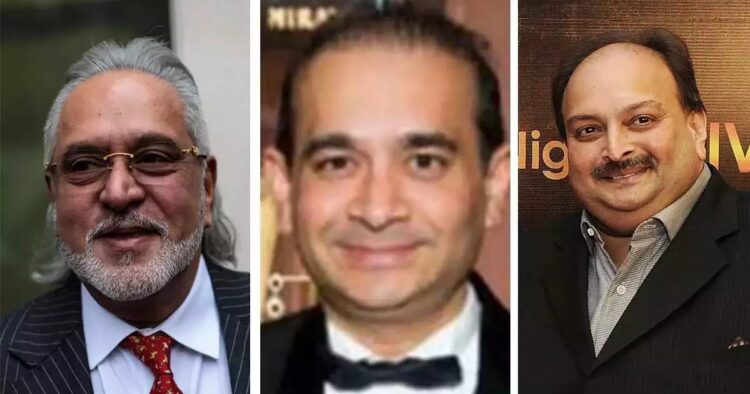KEY POINTS
- Mehul Choksi arrested in Belgium after CBI request
- Accused in ₹13,000 crore PNB scam with Nirav Modi
- Used fake LoUs to cheat the bank
Fugitive diamond businessman Mehul Choksi, who was once the chairman of Gitanjali Group, has been arrested in Belgium by local police. His arrest came after a request was made by India’s Central Bureau of Investigation (CBI). Choksi has been on the run for many years after being accused in the Punjab National Bank (PNB) fraud case, one of the biggest financial scams in India. Along with his nephew, Nirav Modi, Choksi was accused of cheating the bank of over Rs 13,000 crore by using fraudulent bank transactions.
This arrest has once again brought attention to some of the biggest bank frauds in India’s history. These scams have not only hurt the country’s banking system but have also shown the urgent need for stricter regulations, better loan monitoring, and stronger punishment for high-profile defaulters. Here are five of the most shocking bank fraud cases that shook India.
ALSO READ: “Fugitive Businessman Mehul Choksi Arrested in Belgium, Extradition Proceedings Begin”
1. ABG Shipyard Scam – Rs 22,842 Crore
The ABG Shipyard scam is known as India’s biggest bank fraud till date. This scam involved the misappropriation of Rs 22,842 crore from a group of 28 banks. Leading banks like ICICI Bank and State Bank of India (SBI) were among the major lenders.
The fraud happened between 2012 and 2017, during which the company is said to have diverted loans using shell companies and layered transactions. In 2019, SBI’s internal team detected the fraud and reported it. The CBI is investigating the case, and many have questioned how such a huge amount went unnoticed for so long.
2. Nirav Modi and Mehul Choksi – Rs 13,000 Crore
In 2018, the names Nirav Modi and Mehul Choksi came into headlines for pulling off a massive fraud against Punjab National Bank (PNB). The duo used unauthorized Letters of Undertaking (LoUs) from PNB to get loans from banks abroad.
This led to a loss of more than Rs 13,000 crore. While Nirav Modi is fighting extradition in the UK, Choksi had fled to Antigua. With his recent arrest in Belgium, Indian authorities are hopeful of finally bringing him back. Several of Choksi’s properties, including those of Gitanjali Gems, have already been auctioned to recover the stolen money.
3. Vijay Mallya – Rs 9,000 Crore
One of the most high-profile cases is that of Vijay Mallya, owner of the now-defunct Kingfisher Airlines. Mallya is accused of defaulting on loans worth Rs 9,000 crore borrowed from Indian banks.
He escaped to the UK in 2016, just before the authorities could act. Even though India has made several extradition requests, Mallya still remains out of the country. His case shows how difficult it is to recover money from influential defaulters, and it also brought attention to the loopholes in the loan approval system.
4. Satyam Computers Scam – Rs 7,800 Crore
Back in 2009, Ramalinga Raju, the founder of Satyam Computers, admitted to committing a massive corporate fraud. He falsified the company’s accounts by over Rs 7,800 crore. This shook investor confidence and damaged India’s image in the tech world.
The scam revealed poor corporate governance practices, and after this, the Indian government introduced tougher rules for financial reporting and audits to stop such frauds in the future.
5. PMC Bank Scam – Rs 4,355 Crore
In 2019, the Punjab and Maharashtra Cooperative (PMC) Bank was found to be involved in a Rs 4,355 crore scam. The bank had hidden non-performing assets (NPAs) and had given repeated loans to a failed real estate company, HDIL.
This scam affected thousands of depositors, many of whom lost their life savings. The Reserve Bank of India (RBI) had to step in and take control of the bank. This case highlighted the need to bring cooperative banks under tighter control and surveillance.
All these scams show that India’s banking system has serious weaknesses. Whether it’s big private companies, cooperative banks, or well-known businessmen, fraud and misuse of public money continue to happen.
There is an urgent need for better loan monitoring systems, real-time audits, and faster punishment for fraudsters. Arresting Mehul Choksi is just the beginning. To stop future frauds, India must strengthen its financial laws, ensure transparency, and make sure that no one is above the law, not even powerful businessmen.

















Comments